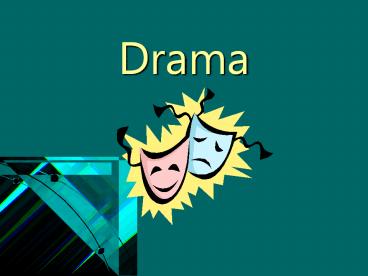Drama - PowerPoint PPT Presentation
Title:
Drama
Description:
Drama * * A drama is a story enacted onstage for a live audience. What Is Drama? What Is Drama? Origins of Drama The word drama comes from the Greek verb dran, which ... – PowerPoint PPT presentation
Number of Views:410
Avg rating:3.0/5.0
Title: Drama
1
Drama
2
What Is Drama?
A drama is a story enacted onstage for a live
audience.
3
What Is Drama?
- Origins of Drama
- The word drama comes from the Greek verb dran,
which means to do. - The earliest known plays . . .
- were written around the fifth century B.C.
- produced for festivals to honor Dionysus, the god
of wine and fertility
4
Dramatic Structure
Like the plot of a story, the plot of a play
involves characters who face a problem or
conflict.
Climax point of highest tensionaction
determines how the conflict will be resolved
Complications tension builds
Resolution conflict is resolved play ends
Expositioncharacters and conflict are introduced
5
Dramatic Structure
- Conflict is a struggle or clash between
opposing characters or forces. A conflict may
develop . . . - between characters who want different things or
the same thing - between a character and his or her circumstances
- within a character who is torn by competing
desires
6
Tragedy
A tragedy is a play that ends unhappily.
- Most classic Greek tragedies deal with serious,
universal themes such as
right and wrong
justice and injustice
life and death
- Tragedies pit human limitations against the
larger forces of destiny.
7
Tragedy
The protagonist of most classical tragedies is a
tragic hero. This hero
pride
- is noble and in many ways admirable
rebelliousness
- has a tragic flaw, a personal failing that leads
to a tragic end
jealousy
8
Comedy
A comedy is a play that ends happily. The plot
usually centers on a romantic conflict.
boy wins girl
boy loses girl
boy meets girl
9
Comedy
The main characters in a comedy could be anyone
nobility
servants
townspeople
10
Comedy
- Comic complications always occur before the
conflict is resolved.
- In most cases, the play ends with a wedding.
11
Modern Comedy
- Modern Comedies
- In modern comedies, the genders in this romantic
plot pattern sometimes are reversed.
12
Modern Drama
A modern play
- may be tragedy, comedy, or a mixture of the two
- usually focuses on personal issues
- usually is about ordinary people
13
Modern Drama
Modern playwrights often experiment with
unconventional plot structures.
long flashbacks
music
visual projections of a characters private
thoughts
14
Speaking Terms
The characters speech may take any of the
following forms.
Dialogue conversations of characters onstage
Monologue long speech given by one character to others
Soliloquy speech by a character alone onstage to himself or herself or to the audience
Asides remarks made to the audience or to one character the other characters onstage do not hear an aside
15
Other Terms
- Character Foil sets of characters with
contrasting characteristics - Comic Relief humorous moment meant to diffuse
tension for the audience
16
Metafiction/Metadrama
- Metafiction as a play or has occasion to It is a
kind of fiction that comments on the very devices
of fiction it employs. It usually involves irony
and is self-reflective. - Metadrama is similar. It is drama that calls
attention to itself as a play or has occasion to
comment on its own actions and devices. - These devices are most apparent in the
play-within-the play in Hamlet but also subtlety
throughout the play as a whole in the constant
juxtaposition of appearance vs. reality as well
as the many faces of Hamlet, himself.
17
The End




























![[PDF] DOWNLOAD Drama Today: A Critical Guide to British Dram PowerPoint PPT Presentation](https://s3.amazonaws.com/images.powershow.com/10091210.th0.jpg?_=20240802082)


